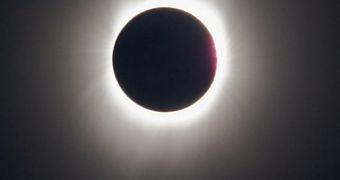This week-end is going to be an exciting one for professional and amateur astronomers worldwide, as some will see a total eclipse of the Sun. Unfortunately for the majority, there is not enough space for everyone on the South Pacific Islands. Scientists say that this might be one of the least observed eclipses, unlike last year's.
This year, the Moon covering the Sun will be most visible from the Cook Islands Sunday July 11 at 8:22 local time, the Easter Island, Patagonia and southern Chile and Argentina. Some scientists will observe it from smaller islands in French Polynesia or from aircrafts or ships specially charted.
For the past eleven years, the solar activity has been unusually low. Scientists, who don't often get a chance to study the Sun's outer atmosphere, or the corona, see this eclipse as a very important one. As there has been some indications that the sunspot's activity will increase, astronomers are very curious to see the aspect of the low and middle corona.
The chairman of the International Astronomical Union's Working Group on Eclipses, professor Jay Pasachoff from Williams College in Massachusetts has chosen Easter Island as his homebase. Along with his team of researchers, they will taken high-resolution images of the eclipse and search for movements in the Sun's outer atmosphere. These images will then be compared with those taken from Polynesia, the Cook Islands and near Tahiti.
This solar eclipse doesn't just mean a lot to scientists; it is also very important for tourism managers, as people will come there to have a better look at the eclipse. On the Mangaia island for example, around 400 people will be staying on Sunday, according to Helen Henry, secretary and manager of the local administration on Mangaia in Cook Islands, in an interview for Radio Australia.
"Everything on the island is booked out and many people will be roughing it. While extra food and drinking water has been brought in from the capital, it's still very much a case of BYO[buy your own] everything," stated Henry.
As for the next visible solar eclipse on November 14 2012, it will be visible from Australia, starting in the Kakadu National Park and traveling east over Cairns and into the Coral Sea.

 14 DAY TRIAL //
14 DAY TRIAL //